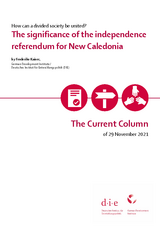The Current Column
How can a divided society be united?
The significance of the independence referendum for New Caledonia
Kaiser, FrederikeThe Current Column (2021)
Bonn: German Development Institute / Deutsches Institut für Entwicklungspolitik (DIE), The Current Column of 29 November 2021
The South Pacific archipelago of New Caledonia became a French colony in 1853 – and remains so to this day. Citizens will go to the polls on 12 December 2021 for a final independence referendum to decide whether or not New Caledonia should become a sovereign state. While society, consisting primarily of the indigenous Kanak people and French settlers, is deeply divided on the independence question, this consultation could provide a key basis for a common and peaceful future.
The Kanak population has been suppressed ever since New Caledonia was colonised. Until 1946, they could be denied citizenship and their basic rights, have their property confiscated arbitrarily, or be resettled or arrested, all with no consequences for those carrying out these actions.
The Kanaks (approx. 40 per cent of the population) are still suffering the social and economic consequences of this today. Many of them feel cheated out of the economic profits that France in particular has generated from the extraction of natural resources, especially nickel.
Their frustration at being marginalised spilled over in the 1980s into violent and, in some cases, deadly confrontations between supporters of the Kanak independence movement and the French state. In order to prevent further escalation, France and the newly formed independence parties reached a contractual agreement in 1989 that the New Caledonian population would vote in up to three referendums on the territory’s independence. Based on these agreements, a referendum will be held for the third time in December, as the previous results in 2018 and 2020 went in France’s favour.
The relevance of the referendum for the Kanaks
The third and decisive referendum therefore marks the high point of a lengthy and contested independence process in which France has only reluctantly returned economic and land rights to New Caledonia, along with selected state powers. The referenda give the Kanak population their first ever opportunity to cast a formal and equal vote on the institutional future of their archipelago. The referendum framework also helps the Kanaks on their journey towards exercising their right to self-determination. Only individuals fulfilling certain criteria are permitted to vote. Among others, eligible voters have to be born in New Caledonia or prove 20 years of continuous residence before the end of 2014. This prevents the referendum from being dominated by new French arrivals.
In the two previous referenda, just 57 per cent and 53 per cent of participants respectively voted against independence. These close results show that, against all expectations, independence proponents, the majority of them Kanaks, can mobilise a significant proportion of eligible voters and thus have a realistic chance of winning in December.
The relevance of the referendum for France
Since 1977, France has recognised the independence of most of its former colonies, yet the New Caledonian independence movement still encounters a great deal of resistance to this day.
One of the main reasons for this is that France has a major strategic interest in the archipelago. New Caledonia is home to 25 per cent of the earth’s nickel reserves and is the world’s fourth largest extractor of the metal, which is primarily used in batteries for mobile phones and electric cars. If the territory gains independence, France will lose its influence on a strategically valuable commodity which will become increasingly scarce in future and is of growing interest for China.
Additionally, from a geo-strategic perspective, New Caledonia and French Polynesia are the last remaining locations in the Pacific where France can maintain its military and political influence. Following the recent collapse of a major deal on the sale of French submarines to Australia, New Caledonia’s independence would signify a further setback to France’s interests in this region.
The referendum as a unifying moment?
The forthcoming referendum will reveal once again the deep division within New Caledonian society. However, it will also be the first time that Kanaks and French settlers will have cast their ballot in three referenda on their future as one community of eligible voters and as the population of a potentially sovereign state under international law.
Whether this shared moment can help to overcome past conflicts and build a peaceful common future depends on many factors.
It is extremely important in this context that all parties accept the process and outcome of the final referendum. Independence party FLNKS has already announced that it will not accept the referendum’s date due to the pandemic situation. Additionally, in order for a pro-independence vote to become reality, it must subsequently be approved by the French parliament.
Furthermore, the referendum will not resolve the issue of economic discrimination against the Kanaks, reduce the archipelago’s current high level of financial dependence on France, or remedy the implications of lacking diversification within the economy. The population still needs to join forces to tackle these challenges.
Frederike Kaiser is a participant of the 57th course of the Postgraduate Training Programme at the German Development Institute / Deutsches Institut für Entwicklungspolitik (DIE).

